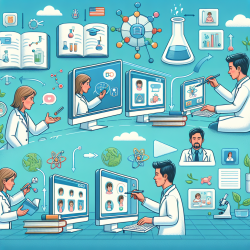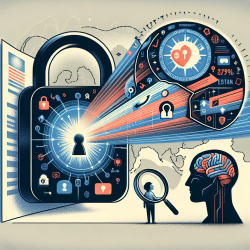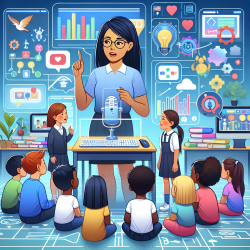Introduction
In the dynamic world of speech-language pathology, the integration of actionable science is becoming increasingly vital. As professionals dedicated to improving child outcomes, it's essential to harness the power of data-driven decisions and evidence-based practices. The research article, "Becoming an Actionable Scientist: Challenges, Competency, and the Development of Expertise," offers valuable insights into the competencies required to produce actionable science. This blog will explore how practitioners can enhance their skills by implementing these findings, ultimately leading to better outcomes for children.
Understanding Actionable Science
Actionable science refers to scientific research that is not only useful but also usable by practitioners in real-world settings. It bridges the gap between theory and practice, ensuring that scientific outputs have a tangible impact. The research highlights 18 competencies categorized into cognitive, interpersonal, and intrapersonal domains, essential for producing actionable science. By developing these competencies, practitioners can effectively address challenges and improve their practice.
Cognitive Competencies
Cognitive competencies involve critical thinking, problem-solving, and strategic planning. For speech-language pathologists, this means understanding the broader context of a child's communication needs and strategically planning interventions. By adopting systems thinking, practitioners can consider how their interventions interact with the child's environment, including family dynamics, educational settings, and cultural contexts. This holistic approach ensures that interventions are tailored to the child's unique needs, leading to more effective outcomes.
Interpersonal Competencies
Interpersonal competencies are crucial for building strong relationships with children, families, and colleagues. Effective communication is at the heart of speech-language pathology, and practitioners must be adept at adjusting their communication style to suit different audiences. This involves active listening, empathy, and the ability to convey complex information in an accessible manner. By fostering trust and collaboration, practitioners can create a supportive environment that encourages children to reach their full potential.
Intrapersonal Competencies
Intrapersonal competencies involve self-awareness, emotional regulation, and resilience. Practitioners must be mindful of their own biases and emotions, ensuring that they do not interfere with their professional judgment. By cultivating empathy and humility, practitioners can better understand the perspectives of children and their families. Additionally, persistence and adaptability are essential for navigating the challenges of speech-language pathology, allowing practitioners to remain focused on their goals despite setbacks.
Implementing Actionable Science in Practice
To become an actionable scientist, practitioners must engage in continuous learning and reflection. This involves seeking out professional development opportunities, collaborating with colleagues, and staying informed about the latest research. By integrating actionable science into their practice, speech-language pathologists can enhance their expertise and improve outcomes for children. Moreover, practitioners should embrace a service identity, prioritizing the needs of children and families above their own.
Conclusion
Incorporating actionable science into speech-language pathology practice is essential for achieving meaningful outcomes for children. By developing the competencies outlined in the research, practitioners can enhance their skills and become more effective in their roles. As we continue to navigate the complexities of child communication disorders, let us commit to using evidence-based practices and data-driven decisions to create a brighter future for the children we serve.
To read the original research paper, please follow this link: Becoming an Actionable Scientist: Challenges, Competency, and the Development of Expertise.










